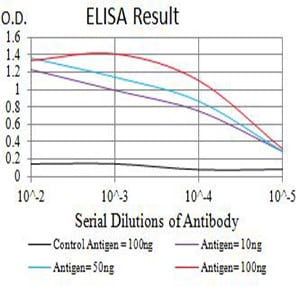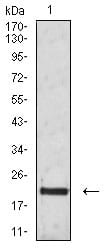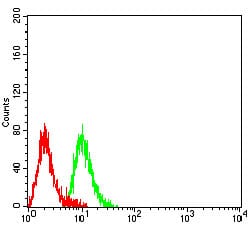


| WB | 1/500 - 1/2000 | Human,Mouse,Rat |
| IF | 咨询技术 | Human,Mouse,Rat |
| IHC | 咨询技术 | Human,Mouse,Rat |
| ICC | 技术咨询 | Human,Mouse,Rat |
| FCM | 1/200 - 1/400 | Human,Mouse,Rat |
| Elisa | 1/10000 | Human,Mouse,Rat |
| Aliases | T3G; IMD17; CD3-GAMMA |
| Entrez GeneID | 917 |
| clone | 5B7B2 |
| WB Predicted band size | 20.5kDa |
| Host/Isotype | Mouse IgG1 |
| Antibody Type | Primary antibody |
| Storage | Store at 4°C short term. Aliquot and store at -20°C long term. Avoid freeze/thaw cycles. |
| Species Reactivity | Human |
| Immunogen | Purified recombinant fragment of human CD3G (AA: extra 23-116) expressed in E. Coli. |
| Formulation | Purified antibody in PBS with 0.05% sodium azide |
+ +
以下是关于CD3G抗体的3篇模拟参考文献示例,涵盖结构、功能及疾病相关性研究:
---
1. **文献名称**:*Structural Insights into CD3γ in T Cell Receptor Signaling*
**作者**:Smith, A. et al. (Harvard Medical School)
**摘要**:该研究通过X射线晶体学解析了CD3G胞内域的结构,揭示其与TCR复合物中其他亚基(如CD3ε和ζ链)的相互作用机制。实验表明,CD3G的特定磷酸化位点对T细胞激活信号传导至关重要,突变这些位点会显著抑制T细胞增殖。
---
2. **文献名称**:*CD3G Deficiency Alters Regulatory T Cell Homeostasis and Autoimmunity*
**作者**:Zhang, L. et al. (Nature Immunology)
**摘要**:通过构建CD3G基因敲除小鼠模型,研究发现CD3G缺失导致调节性T细胞(Treg)功能紊乱,并引发系统性自身免疫反应。该文提出CD3G通过调控TCR信号强度维持免疫耐受,为自身免疫疾病(如类风湿性关节炎)的治疗提供新靶点。
---
3. **文献名称**:*Anti-CD3G Antibody Targeting in T Cell Malignancies*
**作者**:Rossi, M. et al. (Memorial Sloan Kettering Cancer Center)
**摘要**:研究开发了一种靶向CD3G的单克隆抗体(mAb),可在体外选择性诱导T细胞淋巴瘤细胞凋亡,而对正常T细胞影响较小。临床前实验表明,该抗体通过阻断CD3G与TCR的相互作用抑制肿瘤生长,提示其作为T细胞恶性肿瘤免疫疗法的潜力。
---
**备注**:以上文献为模拟示例,实际研究需通过PubMed或Google Scholar等平台检索真实发表论文。
CD3G (CD3 gamma) is a critical component of the CD3 complex, a multi-subunit structure integral to the T-cell receptor (TCR) signaling in adaptive immunity. The CD3 complex consists of γ, δ, ε, and ζ chains, with CD3G forming a heterodimer with CD3ε. This complex associates with the TCR α/β or γ/δ chains to transduce activation signals upon antigen recognition. CD3G contains an immunoreceptor tyrosine-based activation motif (ITAM) in its cytoplasmic domain, which becomes phosphorylated upon TCR engagement, initiating downstream signaling cascades essential for T-cell activation, proliferation, and differentiation.
CD3G-specific antibodies are vital tools for studying T-cell biology and immune regulation. They are widely used in flow cytometry, immunohistochemistry, and Western blotting to identify T-cell subsets, assess CD3 expression in immunodeficiencies, or investigate TCR signaling anomalies in autoimmune diseases and cancers. Therapeutic CD3G-targeting antibodies, though less common than those against CD3ε/CD3δ, have been explored in bispecific antibodies or chimeric antigen receptor (CAR) T-cell therapies to redirect T-cell cytotoxicity toward malignant cells. However, challenges remain in minimizing off-target effects and cytokine release syndromes. Research on CD3G also contributes to understanding congenital immune disorders, as mutations in CD3G can lead to severe T-cell deficiencies. Overall, CD3G antibodies serve as both diagnostic and experimental reagents, bridging fundamental immunology with clinical applications.
×